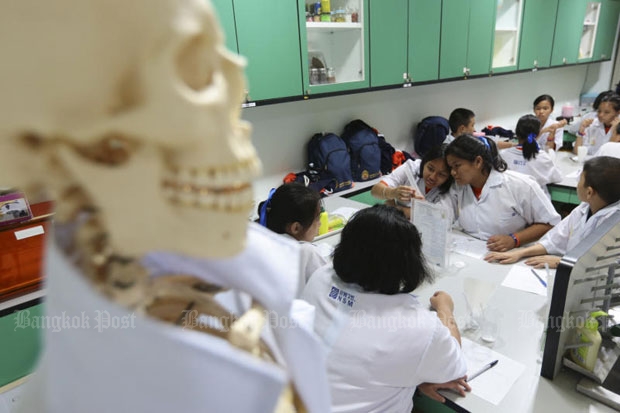
The Education Ministry has devised crucial measures it hopes will dissuade schoolchildren from dropping out of school and address truancy, despite the number decreasing overall year on year.
Deputy Education Minister Surachet Chaiwong said on Friday three measures have been rolled out to stop students from quitting school. The plan will be comprehensive, targeting youngsters who either dropped out of school or were at risk of doing so, as well as those who should be attending school but are not.
For dropouts, the measures will encourage them to return to school and stay there.
The measures follow concerns raised by Wallop Tangkana-nurak, National Legislative Assembly (NLA) member and children's welfare advocate, over school leavers and on the need for the government to find a solution.
According to the ministry, 32,799 students left school before duly graduating in 2012, 12,165 in 2013 and 8,814 in 2014. Of the 2014 figure, 1,760 were in primary education, 4,290 in lower secondary, and 2,764 in upper secondary education.
Some of the reasons given for why students dropped out included parents moving the family to pursue new job opportunities; students leaving to raise a child following an unplanned pregnancy; criminal behaviour that resulted in students facing charges or being sent to juvenile detention facilities.
Figures from the Office of the Basic Education Commission (Obec) found a 70% increase on last year of children leaving school early as a result of their parents finding a new job in a new place.
The agency also discovered that some students who dropped out were slow learners unable to keep up with their classmates.
Gen Surachet said schools and relevant education authorities in the provinces will compile a database of school dropouts and children deprived of educational opportunities.
The data will enable the ministry to work more efficiently in mapping out anti-dropout measures to suit the conditions of each province.
As for incentives for school leavers to return to school, a plan will be jointly conducted by provincial education offices and local education officials.
To prevent students from dropping out, education specialists will make home visits to discuss with the families problems a student may face and possibly offer financial or other assistance.
Gen Surachet said the measures will be carried out as part of education reform, focusing on creating educational opportunities for people from all walks of life.
The ministry is also coming up with numbers on children who should be attending school but are not.
A plan will be devised in response to the data on how this problem can be solved with the help from the private sector.
Meanwhile, Mr Wallop said although the number of students who drop out of schools has been declining over recent years, the issue remains a major problem for Thailand as education plays a pivotal role in developing a healthy economy.